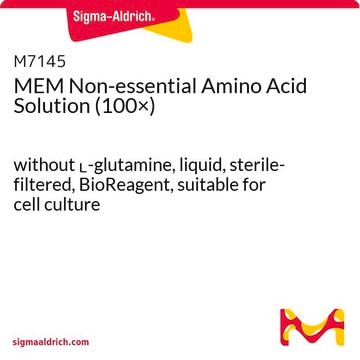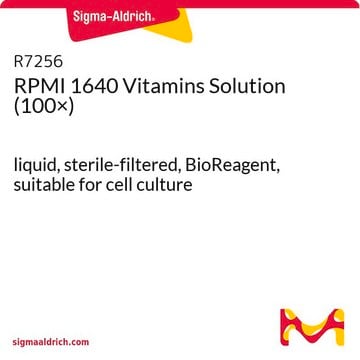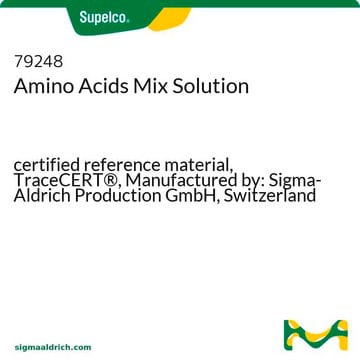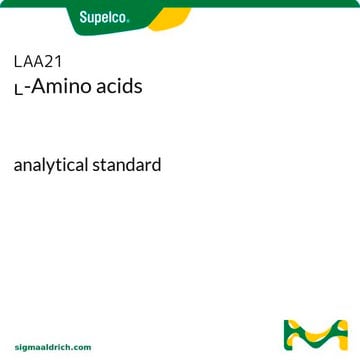R7131
RPMI 1640 Amino Acids Solution (50×)
Without L-glutamine, sterile-filtered, BioReagent, suitable for cell culture
Synonym(s):
Amino Acid Supplement
Sign Into View Organizational & Contract Pricing
All Photos(1)
About This Item
UNSPSC Code:
12352209
NACRES:
NA.75
Recommended Products
sterility
sterile-filtered
product line
BioReagent
form
liquid
technique(s)
cell culture | mammalian: suitable
impurities
endotoxin, tested
shipped in
ambient
storage temp.
2-8°C
General description
RPMI 1640 Amino Acids Solution (50×) serves as an amino acid concentrate to supplement Roswell Park Memorial Institute medium (RPMI)-based mammalian cell culture media.
Application
RPMI 1640 Amino Acids Solution (50×) has been used as a supplement:
- in M9 minimal medium to culture the bacterial strains, SX701 and JE116
- to culture blood neutrophils from lactation cows in vitro
- for amino acid stimulation in amino-acid-free Roswell Park Memorial Institute medium (RPMI) medium to grow HeLa cells
supplement
Product No.
Description
Pricing
Storage Class Code
10 - Combustible liquids
WGK
WGK 1
Flash Point(F)
Not applicable
Flash Point(C)
Not applicable
Certificates of Analysis (COA)
Search for Certificates of Analysis (COA) by entering the products Lot/Batch Number. Lot and Batch Numbers can be found on a product’s label following the words ‘Lot’ or ‘Batch’.
Already Own This Product?
Find documentation for the products that you have recently purchased in the Document Library.
Customers Also Viewed
M Garcia et al.
Journal of dairy science, 99(5), 3777-3783 (2016-03-14)
Glutamine is the preferred AA used by polymorphonuclear leukocytes (PMN) during the inflammatory response. However, the effect of other AA on bovine PMN response during inflammation and how this is altered by stage of lactation has not been fully elucidated.
Nuno Carinhas et al.
BMC systems biology, 5, 34-34 (2011-03-01)
Stoichiometric models constitute the basic framework for fluxome quantification in the realm of metabolic engineering. A recurrent bottleneck, however, is the establishment of consistent stoichiometric models for the synthesis of recombinant proteins or viruses. Although optimization algorithms for in silico
G Ullman et al.
Philosophical transactions of the Royal Society of London. Series B, Biological sciences, 368(1611), 20120025-20120025 (2012-12-26)
We have developed a method combining microfluidics, time-lapsed single-molecule microscopy and automated image analysis allowing for the observation of an excess of 3000 complete cell cycles of exponentially growing Escherichia coli cells per experiment. The method makes it possible to
D Kazyken et al.
The Journal of biological chemistry, 297(4), 101100-101100 (2021-08-22)
The mechanistic target of rapamycin (mTOR) complex 2 (mTORC2) signaling controls cell metabolism, promotes cell survival, and contributes to tumorigenesis, yet its upstream regulation remains poorly defined. Although considerable evidence supports the prevailing view that amino acids activate mTOR complex
Jakub Wiktor et al.
Nature, 597(7876), 426-429 (2021-09-03)
Homologous recombination is essential for the accurate repair of double-stranded DNA breaks (DSBs)1. Initially, the RecBCD complex2 resects the ends of the DSB into 3' single-stranded DNA on which a RecA filament assembles3. Next, the filament locates the homologous repair
Our team of scientists has experience in all areas of research including Life Science, Material Science, Chemical Synthesis, Chromatography, Analytical and many others.
Contact Technical Service







